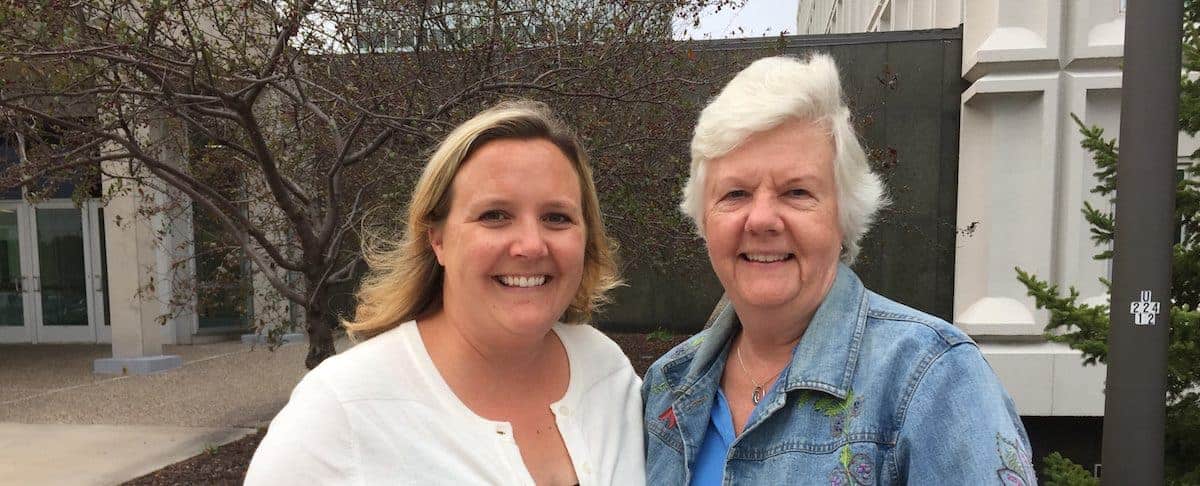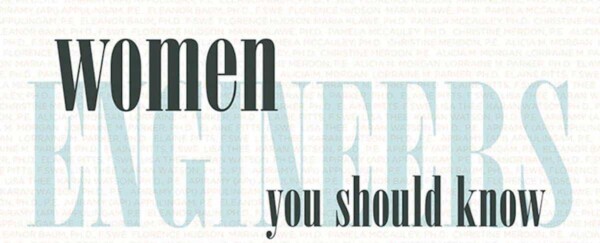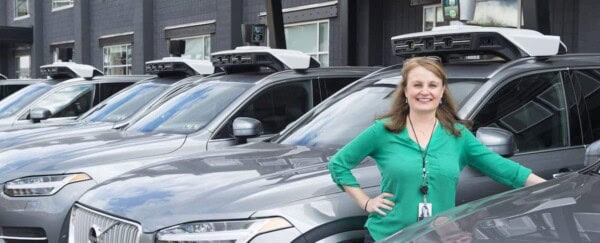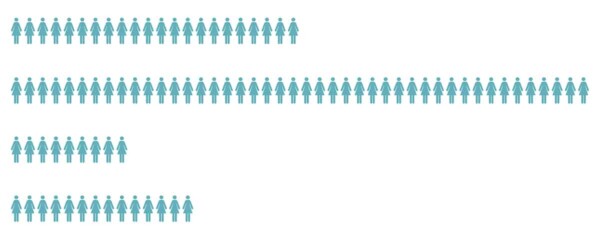This article was first published in SWE Magazine. To read on mobile devices, get the SWE Magazine app. Download on the App Store or get it on Google Play.
By Sandra Guy, SWE Contributor
SWE Past President and Fellow Jaclyn Spear didn’t automatically follow her parents into the engineering profession. Instead, she was raised to go after any career or life goal she chose. “There was never any expectation you couldn’t do something because you were a woman,” said Spear, an electrical engineer and 42-year nuclear industry veteran. She is the program manager at the Savannah River nuclear plant in Aiken, South Carolina, overseeing a variety of analyses, construction, security, and telecommunications work on the Mixed Oxide (MOX) Fuel Fabrication plant being built there.
Spear is one of an untold number of women fortunate to have a female family member serve as an engineering role model. As more women have entered the profession, the likelihood of engineers across the spectrum of mother/daughter/granddaughter, or aunt/niece/grandniece, has also increased. This article is a snapshot in time of some of those family groups.
The Spear family
The third of four sisters, Spear said it was unusual in the 1960s to have a mother who worked outside of the home, so the girls grew up doing the daily chores of cooking, cleaning, and laundry. “By the time I was in junior high school, I was cooking dinner for six,” she said.
Spear said she struggled while completing her engineering degree at her parents’ alma mater, Cornell University. After talking with her mother, the late Amy Spear, P.E., F.SWE, Spear realized that her real aptitude was the business aspect of engineering.
“We were talking and (my mother) said, ‘I hated design work.'”
“I hated designing circuit boards, too.”
“My mother said, ‘I’m an applications engineer.’ In fact, her second master’s degree was in systems engineering. I realized, ‘I can make computer programs do things, but I don’t care how they’re programmed down inside.'”
So, thanks in part to this insight gleaned from her mother, who designed weapons at the Sandia division of the Los Alamos National Laboratory from mid-1948 to mid-1951, Jaclyn Spear confidently earned her B.S. in engineering, an MBA from the University of Pittsburgh, and sought out work where she could thrive.
Spear’s father, the late Ed Spear, P.E., F.SWE, was a World War II veteran who served in the Pacific islands during atomic-bomb testing there. (He and Donald Naismith, Ph.D., became SWE Fellows at the same time, the first two men to do so.) She described her father as a feminist before his time because of his support of his wife’s and daughters’ capabilities and achievements.
Spear and other leading SWE members whose families boast two generations of female engineers tend to have remarkable similarities: The majority of the family members are women; the husband-father or uncles supported the women’s higher education and career ambitions, and the women learned early on to be independent thinkers and leaders.
The women from multigenerational engineering families often solidified their confidence at SWE conferences. They advise other women they can find a good match for their interests and skills in any of a growing number of professions that require an engineer’s intellect and interest in solving problems.
Jaclyn Spear said an assertiveness-training program at a SWE conference helped boost her confidence, and she especially enjoyed meeting and encouraging students during her term (1994-95) as SWE president.
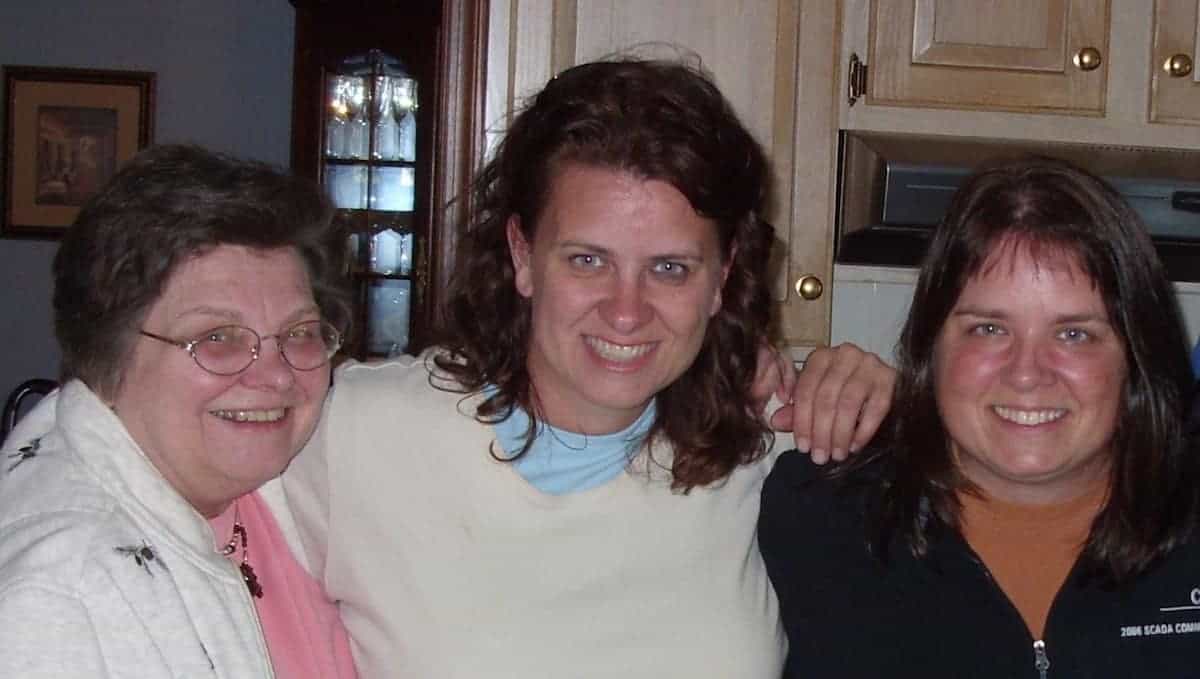
Following “Aunt Bobbie”
Barbara Faust, a SWE Fellow and life member who was the first woman to graduate with a bachelor’s degree in engineering science from the Penn State College of Engineering and the first woman to complete General Electric’s Space Technology Engineering Program (STEP), served as a role model for her two nieces as they pursued their engineering careers.
“Engineering was never a limitation for us because Aunt Bobbie does it,” said Carolyn Johnson, referring to Faust’s family name of endearment. Johnson earned a bachelor’s in physical science with a concentration in mathematics and meteorology from the University of Maryland, and her master’s in engineering science from Penn State. “I remember going with my aunt to GE Day in Valley Forge, Pennsylvania, and seeing the big microscope. It was really cool.”
Johnson’s sister, Colleen Gaskill, remembers their grandfather, William “Bill” Covolus, telling the girls that gender was no barrier to becoming an engineer. “I never thought engineering was a male career. It was just another degree. I didn’t sense any limitation,” said Gaskill, who earned her bachelor’s in chemical engineering and a master’s in engineering science from Penn State. Their grandfather Covolus left Penn State before he finished his industrial engineering degree after not being able to make enough money to finish his senior year.
Johnson and Gaskill also credit their two uncles, also engineers, with playing important roles in boosting their view of the profession. Johnson, in particular, enjoyed going on airplane rides with her Uncle Jerry Faust, who piloted the airplane, and she initially considered aeronautical engineering as a career. Johnson went on to earn a private pilot’s certificate. Both Johnson and Gaskill enjoy working for companies that support expanding the female engineering workforce: Johnson as a smart grid operations analyst at Exelon Corp., and Gaskill a senior process engineer with Honeywell.
Faust said she advises young engineers that they can make their careers their own. “After you make it through the first hurdles — everyone, guy or girl, has to show he or she can do the work the employer expects — you can push boundaries and never stop learning and doing new things,” she said. “It also helps to have bosses who push you to do your best.”
Faust’s can-do attitude originated from her upbringing as the daughter and niece of independent business owners who worked long hours every day to get the job done. Her parents delivered coal and fuel oil, often on Sundays and holidays, because customers would run out and their houses would get cold.
“We would get calls seven days a week,” she said. “Life revolved around the business.” In addition, Faust’s aunt and uncle sold bottled gas and were at their customers’ beck and call, too. “Growing up, it was always about doing the best you can,” she said. “Lowering the bar — just doing good enough — was not the standard I grew up with.”
Faust learned to roll with the punches. She used her skills and multidisciplinary training in a wide-ranging career that has included designing re-entry vehicle and missile payloads, materials characterization, failure analyses, and program management. Faust credits a SWE conference with helping her define a satisfying career path. One particular workshop led attendees in identifying the thread that ran from their early childhood through young adulthood to connect the accomplishments that brought happiness. That thread pointed the way to the type of career they would find most successful.
Now, Faust enjoys encouraging engineering students at Penn State and other young engineers to find their true paths.
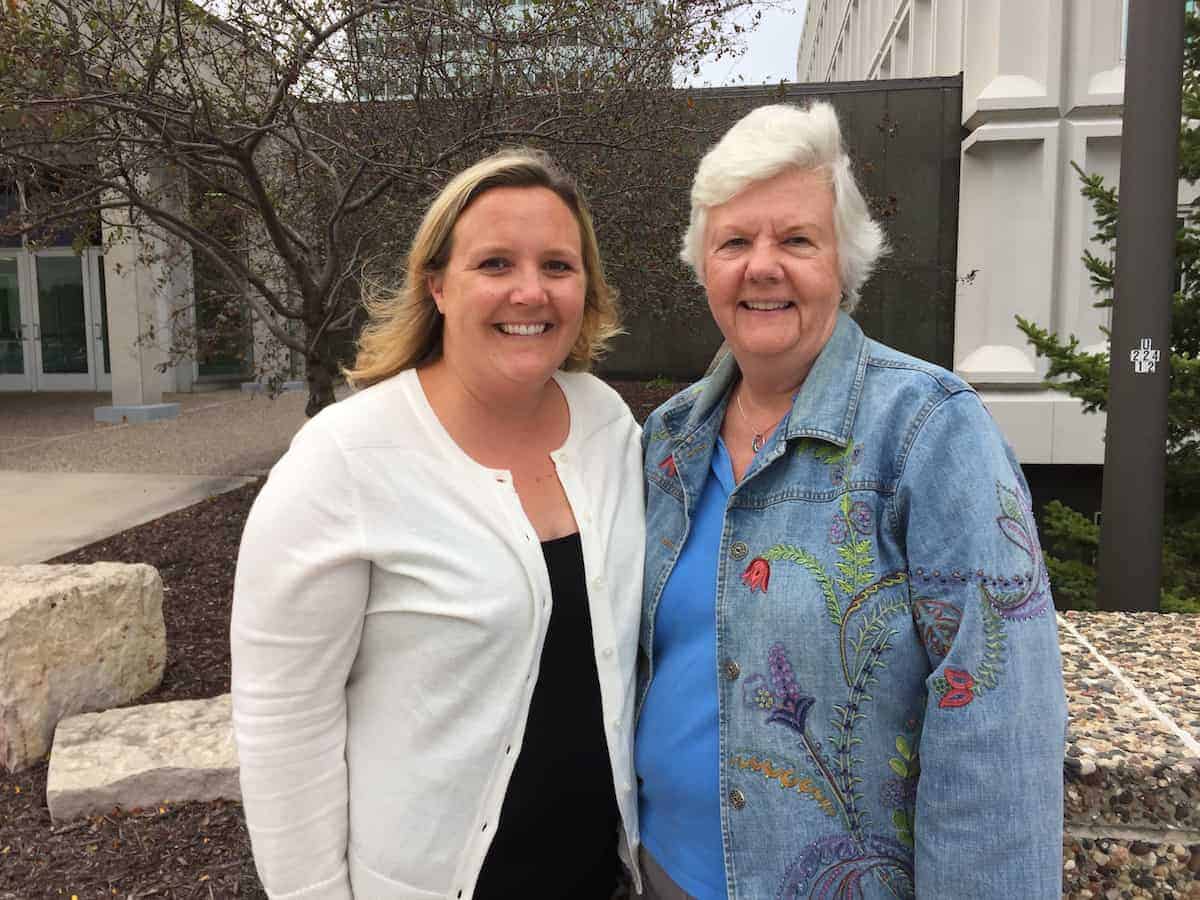
Mom was a SWE president
At least two of the Society’s presidents have had daughters who grew up to be engineers. Industrial engineer Maggie Hickel, F.SWE, who retired from 3M, was SWE president from 1990-91. She is “extremely proud” that her eldest daughter, Katie Peterson, now works as an engineer.
“As a parent, I tried to encourage all three of my daughters to pursue a career where they not only had the abilities, but the passion,” Hickel said. “For Katie, I always thought she should be an engineer. She is bright, objective, a good leader, and very organized and creative. Katie is a problem-solver and, of course, good at math and science.”
Peterson, also an industrial engineer, works as an information technology manager in 3M Co.’s mergers and acquisitions division. She said she looked to her parents as role models. Peterson was impressed that her mom had a community of people to whom she could turn in the Society of Women Engineers — and a community of amazing women with great careers, to boot — and that Hickel was one of only a handful of women to graduate as an engineer among her peers in college.
The Hickels interweaved lessons about science, math, engineering, and technology into everyday activities such as grocery shopping (how much change will we get back from the cashier?) and a visit to the zoo (reading every sign to learn about an animal’s habitat). Hickel said she enjoyed working with her own and other children to show them the “cool” and practical sides of science. “I volunteered at schools and through Girl Scouts, and Katie was either in attendance or saw that I was passionate about my work and science in general,” Hickel said.
Indeed, Peterson has come to admire her mom’s ability to juggle work and family while raising three daughters (Mandy and Stephanie Hickel). Peterson, now a mom herself to sons ages 10, 8, and 6, said she marvels at how her mom served as “the carpool queen” of the neighborhood while raising three daughters, enjoying a successful career, and being involved in the Girl Scouts and her daughters’ sports events and other activities. “I don’t know how she did it,” Peterson said.
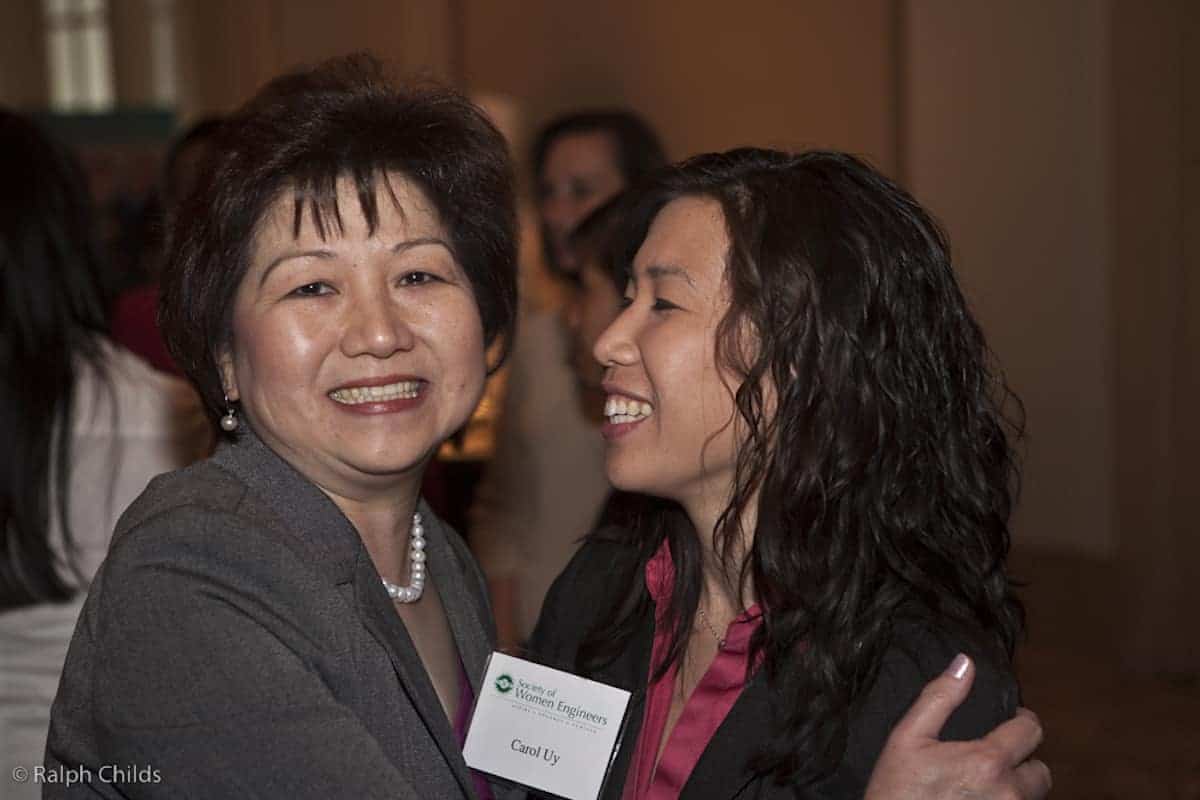
Nora Lin, F.SWE, served as president from 2009-10. Her daughter, Carol Lin Uy, is also an engineer, while her other daughter, Susan, is pursuing a career in marketing analysis.
“I did not talk about my work much at home, due to the nature of the defense industry, where I worked as a software technical lead/manager in my daughters’ early years,” Lin recalls.
“However, I did often sit with both of them to help with homework, even through advanced placement (AP) physics classes in high school. Being a technical person, it provided a great advantage for me to be able to continue teaching my daughters as the content became more difficult.”
Lin and her husband didn’t stress a specific field for their daughters to pursue. “We wanted them to find a career that was interesting to their individual personalities. We knew they would be successful regardless of their career choice, as we had worked hard to instill a diligent work ethic and the necessity of developing marketable skills to support themselves and a family as a working woman.”
Carol Lin Uy said that, “My mom was absolutely a positive influence throughout my schooling, and I still am in awe of her ability to draw upon her technical knowledge, even after being out of school for so many years.” Of those AP physics assignments, Uy recalls, “While I tried to contain my contempt for physics in high school, she flew through the problem sets, reassuring me, ‘It’s just math.'”
The benefit of having an engineer mother became even more evident as Uy navigated her university and early-career pathway. “I had liked chemistry and was looking for advice in declaring a college major; she guided me toward studying engineering and helped me see the possibilities that a degree in engineering offered.” Noting that her mom “was a reassurance through the tough college coursework and supportive of my career choice after graduation,” Uy began working in the consumer packaged goods/food industry. “With my job, I discovered a passion for blending food science and process engineering into a fulfilling career that continues to provide new, interesting challenges for me every day,” she said.
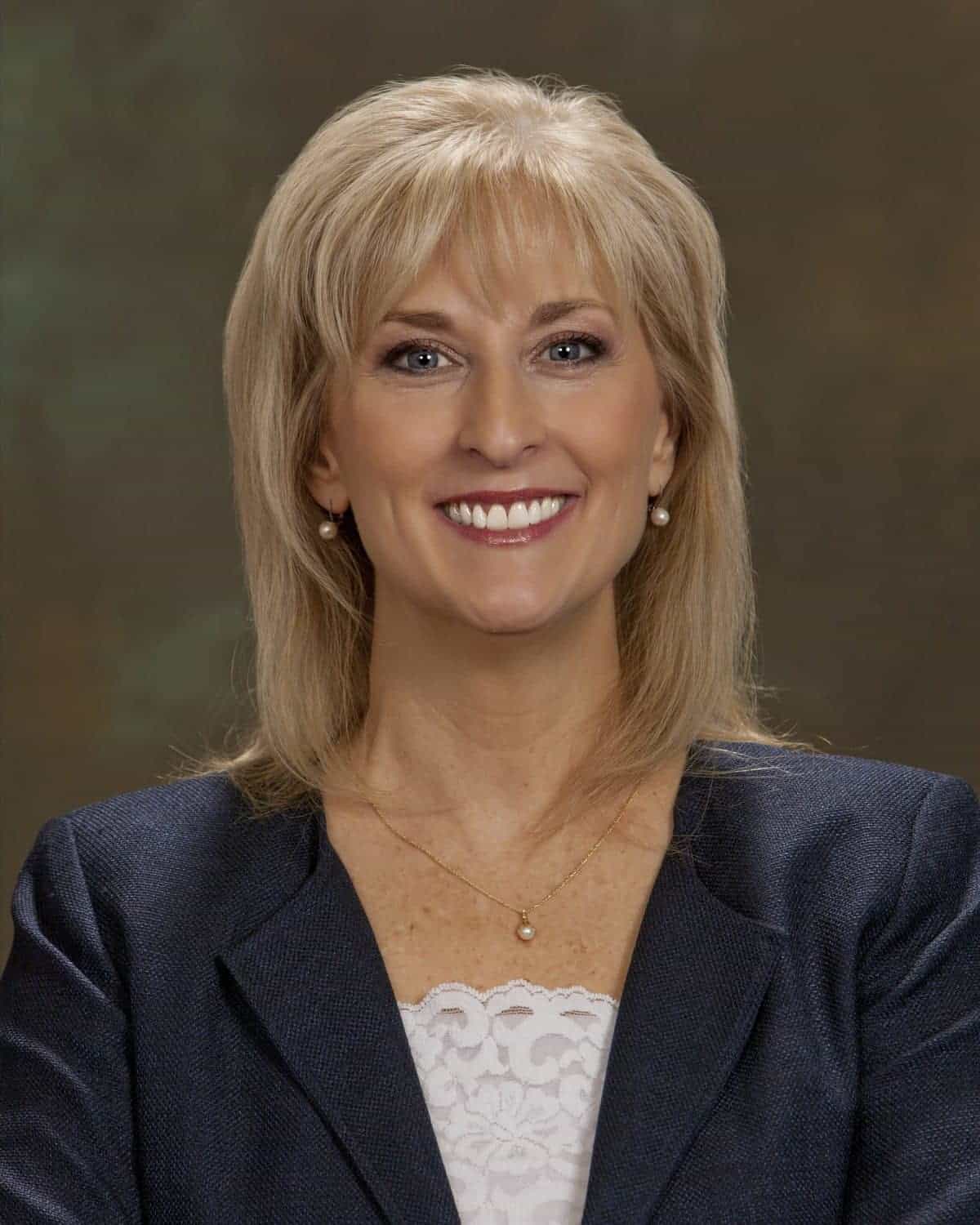
Mother/daughters pay it forward
Tina Kilmer, P.E., an electrical engineer who serves as vice president of product compliance at global lottery and regulated gaming company Scientific Games, grew up the eldest of three sisters whose parents told them they could do anything they wanted. She described her parents, who worked in a variety of industries and owned multiple businesses throughout their careers, as “very much do-it-yourselfers with a very strong work ethic.”
As a result, the sisters were expected to take on big responsibilities from an early age. “From working at family businesses to helping to build our house, we were expected to participate in nearly every job,” Kilmer said. “We had to learn to fix a car before we were allowed to drive it.”
She chose electrical engineering after one of her professors at the University of Illinois at Urbana-Champaign gave her advice based on her keen desire to understand how things worked and her goal to design innovative solutions to problems from a scientific perspective.
Kilmer recalled a potentially difficult experience that was the result of being a female engineer and not conforming to expected gender roles of the time. While working as a project manager in Texas, Kilmer said a truckload of construction workers drove past as she walked to a job site, offering a barrage of catcalls and wolf whistles. Once she got to the job site, she promptly introduced herself as the project leader to those same men, laughed, and thanked them for their warm welcome. “It was a very interesting icebreaker,” she said.
Another mentor, Walter D. McFall, chemical engineer, SWE Rodney D. Chipp Memorial Award recipient, and former technical recruiter at Argonne National Laboratory, who persuaded Kilmer to join SWE. “I never truly thought about being a woman engineer by the time I worked at Argonne,” she said. “There were plenty of other women scientists and engineers there.”
Nevertheless, Kilmer said she “met the most amazing, supportive, and truly gifted women” through SWE and appreciates the training and professional growth SWE has afforded her. “Whether speaking or mentoring, SWE has always allowed me to pay forward by giving back, and that’s important to me.”
Watching two of her four children become engineers is especially gratifying. Kilmer’s husband stayed home to raise the children after his accounting job ended and their fourth child was born with medical issues. She and her husband let their children decide their own careers, encouraging them to pursue their interests and curiosities. Daughters Elise and Karah grew up accompanying their mom to SWE events, Argonne open houses, career fairs, and science fairs. Now engineers themselves, Elise and Karah have co-presented with their mother at SWE conferences.
Elise Kilmer, who earned her biomedical engineering degree with an emphasis in materials science from Arizona State University, works as the manager of a medical monitoring firm. Karah Kilmer, who earned a mechanical engineering and energy and environmental engineering degree from Arizona State, is a measurement and verification engineer in the sustainable energy industry. Now, Karah and Elise are reveling in their SWE experiences. The two co-presented with their mom at the annual conference, advising collegians on effective preparation for the career fair.
“After attending our presentation, women thanked us for the information and assistance, saying they felt more prepared and confident,” Karah said. “It was a huge moment of, ‘Oh my gosh, I’m the person inspiring others?'”
Tina Kilmer said she advises women to trust themselves and live their passion, hold fast to their core values, inspire and be inspired, never stop learning, and share willingly. “Some of life’s biggest blessings begin with its biggest challenges,” she said. “And as I tell my children, be grateful and enjoy the experience.”
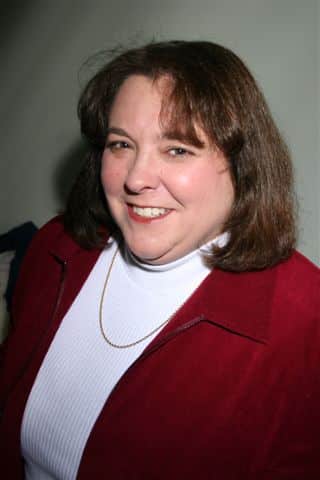
A Large Family of Engineers
The late Yvonne C. Brill is known for her genius in rocket and jet propulsion design, but to her daughter, Naomi, she was just mom.
“She was a brilliant engineer and mentor to everyone else, but to me, she was my mother,” said Naomi Brill, a retired mechanical engineer, SWE Fellow, and SWE Distinguished Service Award recipient who is recognized in her own right for defining next-generation manufacturing processes for portable drug pumps. The processes help people stay home while taking chemotherapy, pain management, and other infusion-based treatments.
Naomi noted that her mother’s main accomplishments came after Yvonne Brill, a former SWE national treasurer and multiple award recipient, had had her three children. “She succeeded at a time when few women had careers outside of the home,” Naomi said.
The lifestyle wasn’t easy for Naomi, especially since the family lived in a rural community just outside of Princeton, New Jersey, where no other mother worked outside of the home. Naomi remembers being called to the elementary school principal’s office every year to confirm that, indeed, her emergency contact — mother Yvonne — was an aerospace engineer, and not a homemaker.
“I’d get called in every year to verify it,” Naomi said. “That finally stopped when my next sibling started school and there were two of us Brill kids telling the same unusual story.”
Though Naomi initially earned a bachelor’s degree in biology from Carleton College, she had no desire to work alone in a research lab. “I was not a solo person,” Naomi said. “I was much more interested in applying science to solve problems in cooperation with other people.” She also had no desire to follow in her mother’s footsteps of staying up until 2 o’clock in the morning, sitting at the kitchen table calculating rocket thrusts and working with a slide rule.
“My dad, the scientist, was always sound asleep,” Naomi said. “I wanted a career that would allow me to sleep at night.” Naomi credited her mother with surreptitiously leading her into engineering as a career, after Naomi felt assured she could get a full night’s sleep.
“My mother did something very smart,” Naomi recalled. “She was the national SWE student activities coordinator, so she contacted students in the University of Minnesota SWE section, and they showed me all kinds of things engineers do and how the university worked. They assured me it wasn’t necessary to stay up all night to be a successful engineer. That’s how I ended up with a second degree in mechanical engineering.”
The experience heightened Naomi Brill’s awareness of and appreciation for the many disciplines within the engineering field and within SWE, and how engineers rely on others from varying technical areas.
“My mother was a passionate research-and-development engineer,” Naomi said of her mother, who died at age 88 on March 27, 2013. “She was a design engineer. I was a manufacturing engineer. I developed processes and procedures for making things, and taught production employees how to build quality products. So I worked much more as a team leader, teacher, and coach.
“The patent (Yvonne Brill) holds on the hydrazine-resistojet thruster enables weather and telecommunications satellites to stay in their proper orbit above the earth, enabling better weather forecasting and more expansive smartphone communications, even today.”
Among other honors, Yvonne Brill received the SWE Achievement Award, the SWE Resnik Challenger Medal, the NASA Public Service Medal, the ASME Kate Gleason Award, the IEEE Judith A. Resnik Award, and the American Institute of Aeronautics and Astronautics Wyld Propulsion Award. She received the National Medal of Technology and Innovation from President Barack Obama in 2011.
The moral: “There is a type and discipline of engineering for every personality type,” Naomi Brill said.
Naomi and her mother also enjoyed mentoring younger women and encouraged them to pursue engineering. “I tell people engineering is a wonderful career,” said Naomi, who now primarily influences the influencers — high-school administrators and guidance counselors. “Anyone with innate curiosity who likes people and wants to solve problems will be a very successful engineer.”
It turns out that the engineering career inspiration has been passed on to more Brill female family members.
Naomi said her mother influenced Yvonne’s niece, Beth Weckman, Ph.D., P.Eng, a mechanical engineering professor and fire safety specialist at the University of Waterloo in Kitchener, Ontario, and Beth’s daughter, Nicole Weckman, who is a biomedical engineer. Great-niece Deb Harris studied chemical engineering at Carnegie Mellon University, and granddaughter Lauren Brill is pursuing environmental engineering studies at Tufts University.
“And, true to our family belief in diversity and opportunity for all, there are four men in the family with engineering degrees or related careers, including great-nephew Eric Harris and grandson Michael Brill,” Naomi said. “I am proud to be part of a large family of engineers, but even more honored to be associated with all the women engineers my mother mentored, at all career stages, whom we consider part of our extended family.”
Author
-
![For Mother's Day: Engineering Across the Generations [] SWE Blog](https://alltogether.swe.org/wp-content/uploads/2021/10/swe-favicon.png)
SWE Blog provides up-to-date information and news about the Society and how our members are making a difference every day. You’ll find stories about SWE members, engineering, technology, and other STEM-related topics.


